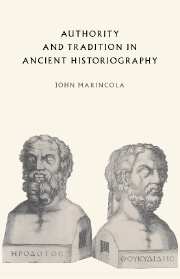Book contents
CONCLUSION
Published online by Cambridge University Press: 29 January 2010
Summary
Our study has concentrated on the explicit attempts by the ancient historians to convince the reader of their authority to narrate the deeds, and to portray themselves as believable narrators of those deeds. We have seen how the dictates of ancient literary criticism enjoined authors to work within a tradition, and to show their innovation within that tradition. As certain historians became accepted models for imitation, their concerns and approach dictated for those who followed the proper way to write history. As the earlier historians were ‘authoritative’, so their followers sought to imitate the manner by which those predecessors had constructed their own authority. It was in this way that authority and tradition were closely related, and so long as the belief in imitation held sway, there could be no authority outside of tradition.
In concluding, it may be useful to organise our results according to three categories. In the first we shall summarise our findings by topic, following the order of the chapters in the book. Then we shall compare the procedures of contemporary and non-contemporary historians. Finally, we shall look at some of the differences between Greek and Roman historians.
In presenting his work to the public, the ancient historian portrays it as something of great importance both in the doing and the telling.
- Type
- Chapter
- Information
- Authority and Tradition in Ancient Historiography , pp. 258 - 266Publisher: Cambridge University PressPrint publication year: 1997



